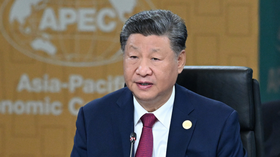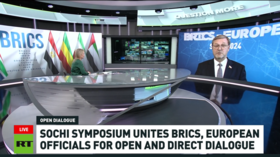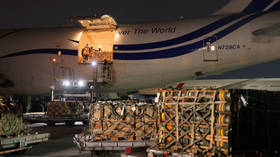Ban on tech sales to Russia could spark global microchip war – expert

The ban on technology exports to Russia, in response to the war in Ukraine, could backfire on global manufacturers of computer processors and semiconductors, as many crucial components for their production are made exclusively in Russia, an industry expert has warned.
“The ban on finished products for Russia will result in a retaliatory ban on the supply of production components and will cause an acute shortage of microprocessors for the whole world. By comparison, the end-of-2021 supply disruption situation will appear relatively light,” Oleg Izumrudov, head of the Consortium of Russian Developers of Data Storage Systems (RosSHD), says.
His statement comes after the world's largest manufacturers of computer processors and semiconductors announced that they will join the sanctions against Russia over its military campaign in Ukraine. A number of technology manufacturers halted product deliveries to Russia, including US majors AMD and Intel, while the world’s largest semiconductor chip producer TSMC stopped the production of Russian Baikal and Elbrus microprocessors at its Taiwanese plant.
While global tech majors are announcing their split from Russia, Izumrudov says potential Russian retaliation moves “would leave almost the entire world without microelectronics.”
According to the expert, Russia accounts for 80% of the market for sapphire substrates – thin plates made of artificial stone, which are used in “every processor in the world,” including those manufactured by AMD and Intel.
“Our position is even stronger in special chip etching chemistry using ultra-pure components. Russia accounts for 100% of the world's supply of various rare earth elements used for these purposes,” the expert states.
According to him, Russian components for manufacturing semiconductors would be almost impossible to replace.
“Talking about sanctions against Russian microelectronics is impossible without talking about global microelectronics… It will not be possible to abruptly replace [Russia] with a resource of alternative substrate production locations, and there is no way to replace rare earths from Russia,” Izumrudov states.
He says the timeframe to ensure the quality of sapphire substrates, required for microchips, for instance, is 30 years of continuous production. Plants at which they can be made have to be located in conditions of almost zero seismic activity, which means the products of enterprises similar to those in Russia in seismically active California or Taiwan “are noticeably inferior in quality and volume to the level required in the industry.”
According to Izumrudov, even in the worst-case scenario, where Western states succeed in cutting Russia off from its existing tech partners, Russia has a number of “just in case” options to reorient the industry. The first option is to work with mainland China-based Semiconductor Manufacturing International Corporation (SMIC) and its AMEC factory. It is inferior to TSMC, but “this is temporary,” Izumrudov says.
In addition to China, he adds, India could be “a partner with huge potential in IT in general and microelectronics in particular.”
“The country is interested in entering the global market [and] it has all the necessary basic elements, especially human resources, for this. It is enough to pay attention to the number of Indians in top management of IT giants and start-ups, including in the field of microelectronics,” the expert explains, calling the possibility of Russia’s tech interaction with India “very promising.”
According to Izumrudov, a third option also exists, and it lies in the creation of new technologies within Russia.
“In addition to purely geographical solutions to the problem, there is also a way to create a completely new technological approach to the production of semiconductors,” he states. Izumrudov suggests replacing silicon in semiconductors with gallium arsenide, a material used in infrared optics and microelectronics, which would allow the creation of 3D chip architectures instead of the currently used 2D wafer printing. The production of such solutions has been established in the Russian city of Perm for the needs of the Ministry of Defense, the expert says, adding that the technology has potential for civilian application and research on it is already being carried out.
For more stories on economy & finance visit RT's business section














